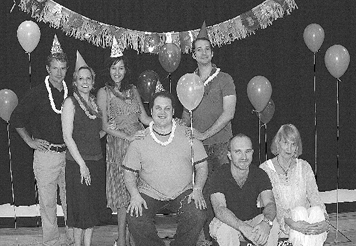By Jerry Tallmer
Tina Howe won’t let anybody read the first play she ever wrote, if indeed a script can still be unearthed. What she’ll tell you is that it was called “The Nest,” that it was done up at Provincetown, Mass., and in New York City, that “it was about how women compete with men, and in it Jill Clayburgh jumped out of a wedding cake and was licked clean.”
Here in New York it got “excoriating reviews” and closed in one night — “but because I’m a Yankee, I said: ‘Oh, they ain’t seen nothin’ yet.’ ”
They sure ain’t, and 36 years and a goodly number of much-better-received plays later, Tina Howe weighs in (at the Atlantic Theater) with a comedy (of sorts) in which a self-centered, tantrum-throwing monster of a 4-year-old is played by a fully grown adult male. The play is called “Birth and After Birth.”
In it, Bill (Jeff Binder) and Sandy (Maggie Kiley), the sorely tested doting parents of 4-year-old Nicky (Jordan Gelber), are readying a birthday party for their offsprout when who should drop in from the other side of the world but Jeffrey (Peter Benson) and Mia (Kate Blumberg), a couple of dedicated anthropologists who think science — i.e., the study of primitive other people — is infinitely more important than having and rearing one’s own children.
The evening goes ballistic from there, accelerated by what appears to be a death in childbirth, with Nicky screaming: “How could you kill somebody on my birthday?”
“Birth and After Birth” was originally written 34 years ago. Like its title, it has had a considerable measure of afterbirth. Rewriting, that is. And rethinking.
“It’s been underground, a bottom-feeder,” says the playwright, lounging back on a sofa in her and her husband’s Upper West Side apartment. “People knew it. I have these fans. It had all these illegal productions. When it was first sent out to theaters around the country, most were appalled and didn’t know how to handle it. Then when my star started to rise again, with ‘Painting Churches’ [1983], I knew I had to rewrite ‘Birth,’ but at that point I wasn’t interested in it.
“Then in 1994 or ’95 it had two productions, one at the Wilma Theater in Philadelphia and the other at the Wooly Mammoth in Washington, D.C., and they were wonderful productions, but I saw I had to go back into the play and take responsibility for it, which I did. Now, here in New York, in my growing infinite wisdom I’ve gone back into it once more and am staunching up the holes.”
The birth of “Birth and After Birth” — well, no, the conception — occurred in the mid-1960s when Ms. Howe and her husband had been married five years and not yet had a child.
“One day my German sister-in-law — my brother’s ex-wife — came to me and said: ‘Tina, zhu are not a voman until zhu haff a child.’ I was so horrified and appalled, I knew I had to write a play to deal with the whole huge issue of women and children in the most profound and comical way I could.”
Her husband is Norman Levy, professor of American Studies at NYU. They are the parents of son Eben — as in Eugene O’Neill’s “Desire Under the Elms”? — “You got it. But he was a darlin’ baby, and today is a wonderful musician and composer” — and daughter Dara.
“Want to know what she does?” says Dara’s mother, suppressing a giggle. “Teaches nursery school in this city.” Pause. “I think young children are larger than life, equal parts of exhaustion and delicious.”
Sometime in 1970 or ’71, not long after the birth of Dara, when Norman Levy was teaching at SUNY Albany, “and we were living upstate in the middle of nowhere, Kinderhook, New York — which a local wag said sounded like a German abortion tool — I joined a women’s-consciousness group.
“It was mostly young mothers like myself, and what came out in these confessional meetings was their collective terror in having babies. When it came my turn to speak I said: ‘I’m really having trouble with the second act of my play. I loved motherhood, but writing these Goddamned plays is so hard.’ At which they all yelled: ‘You’re just here to spy on us and steal our material!’ ”
Sits bolt upright. “So I left the group.”
You know, said an intrusive interviewer, I remember a play about a husband and wife who had once been young and once had had, or thought they’d had, or pretended they’d had, a not-visible son.
“Oh yeah, yeah,” said this other playwright before the words “Virginia Woolf” could materialize out of thin air. “But that was a rhetorical baby. I wanted to get right into the playpen.”
Or out of the old-folks’ warehouse. Her newest script, “Good Night, Sweet Ladies,” now making the rounds of theater companies, is about “two old ladies planning an escape from a nursing home.”
Tina Howe comes by her Yankee blood honestly. Her self-disparaging “very New England” father, Quincy Howe, one of the great foreign correspondents of the Edward R. Murrow era — he and Murrow were among the first American newsmen to bring back photos of piles of bodies from the death camps of the Holocaust — always had the feeling “we’re all imposters” about his so-called glamorous profession.
“And that’s why I can be so brazen,” says Quincy Howe’s daughter. “I tell my students at Hunter [where she teaches playwriting]: ‘Come out of a quote unquote disaster, and you have nowhere to go but up.’”
Or out of the womb, into the sunlight.
BIRTH AND AFTER BIRTH. By Tina Howe. Directed by Christian Parker. In previews toward an October 3 opening (through October 29) at the Atlantic Theater, 336 West 20th Street, (212) 239-6200.




























